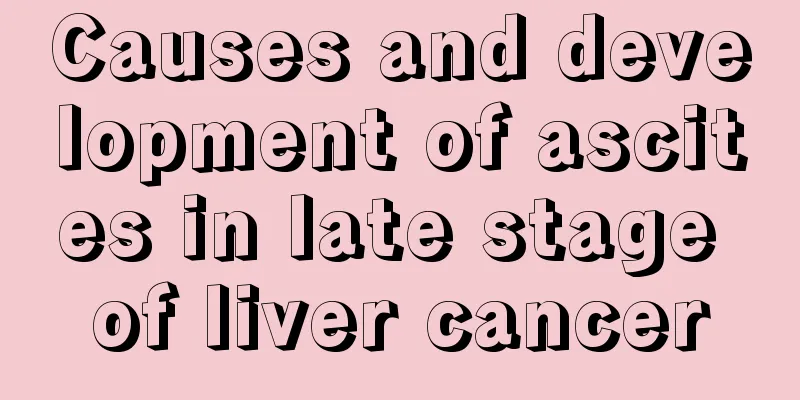Causes and development of ascites in late stage of liver cancer

|
Liver cancer is a cancerous disease that occurs in the liver. The mortality rate of liver cancer is second only to gastric cancer and esophageal cancer, and it is one of the most common malignant tumors. The main symptoms of advanced liver cancer are liver pain, fatigue, weight loss, jaundice, ascites, etc. So why does ascites occur in the advanced stage of liver cancer? How does ascites develop? The most basic reason for the formation of ascites in the late stage of liver cancer is the loss of balance between the production and absorption of fluid in the abdominal cavity. There are four stages in the development of ascites in cirrhosis: 1. Early stage of hepatic ascites At this time, the patient has no ascites, nor does the systemic artery dilatation and insufficiency of filling, but excessive sodium intake will cause water and sodium retention, that is, the kidney's sodium processing has been impaired. This is due to liver dysfunction and increased portal pressure directly affecting the kidney's sodium processing through nerve reflexes, but this water and sodium retention is self-limiting. 2. Reactive ascites stage During this period, the sodium and water retention in the kidneys increases significantly, which causes the total blood volume to expand, and then the peripheral arteries expand to reduce vascular resistance. The expansion of peripheral arteries is due to the release of a large number of various vasodilators by visceral tissues, which causes the visceral circulation and systemic circulation to expand in turn. Subsequently, ascites is formed according to the peripheral artery hypothesis. 3. Refractory ascites stage At this stage, patients have severe liver disease, significant sodium and water retention, are insensitive to diuretic treatment, and have unstable hemodynamics. The plasma renin-angiotensin-aldosterone system and the sympathetic nervous system are hyperactive, and the peripheral blood vessels are less responsive to vasoactive substances. However, the renal blood vessels are very sensitive to vasoconstrictors, and the renal sodium reabsorption is further increased while the excretion is reduced, resisting the effects of diuretics and natriuretic factors. 4. Hepatorenal syndromeThis stage mostly occurs in patients with decompensated cirrhosis with refractory ascites. Due to further peripheral arterial dilation, hypotension occurs. In order to maintain effective circulating volume, the body increases the synthesis of vasoconstrictor substances, especially the increase in plasma endothelin levels. Due to the high sensitivity of renal blood vessels to contractile substances at this time, selective renal hypoperfusion, severe sodium and water retention, and renal failure occur. Liver cancer combined with cirrhosis, patients have increased portal pressure in the liver, which leads to increased venous pressure. In addition, patients with cirrhosis are accompanied by hypoproteinemia, which reduces the colloid osmotic pressure, increases the production of hepatic lymph fluid, and thus causes fluid leakage, forming ascites. At the same time, patients with cirrhosis also have water and sodium retention. Experiments have shown that limiting sodium intake or using sodium excretion diuretics can make ascites disappear, and increasing sodium intake can cause ascites to reappear. Therefore, sodium restriction is very important in the treatment of ascites. However, long-term salt restriction can also lead to loss of appetite and reduced food intake. Therefore, when there is a large amount of ascites, it is advisable to restrict sodium salt intake in the short term, preferably 1.3g per day, and maintain 2.2-3.5g/d after the symptoms improve. For patients with hyponatremia, the amount of water intake should be controlled at the same time, preferably 500ml more than the urine volume of the previous day, about 750-1000ml. Through the above explanation, we know the causes and development of ascites in the late stage of liver cancer. I believe everyone has a certain understanding of liver cancer. If you have liver cancer, you must go to a regular hospital for diagnosis and treatment as soon as possible. I hope this article can help you or your friends. This article is for reference only. If you have other questions about liver cancer, please consult our experts online. Liver cancer http://www..com.cn/zhongliu/ga/ |
<<: What is the relationship between lung cancer and tuberculosis?
>>: Question: How should I maintain my health after brain cancer surgery?
Recommend
How should lung cancer patients eat? Lung cancer patients should eat like this
When it comes to lung cancer, its high mortality ...
How can I improve sweating under my armpits?
When the weather is hot, we like to sweat a lot, ...
Cost of early treatment of esophageal cancer
The incidence of esophageal cancer in my country ...
Composition of the brainstem_What does the brainstem consist of
The structure of the human brain is relatively co...
Is the ultrasonic mite remover reliable?
Ultrasound is a high-tech product with powerful f...
How to clean oil stains on a white T-shirt?
T-shirts are a type of clothing that modern peopl...
Fibroids are closely related to genes and heredity
Does fibroid tumor have an important relationship...
What's the matter with excessive saliva
Many people drool a lot in normal times. It is no...
Will staying up late shorten your life?
Staying up late is a very common phenomenon in mo...
What are the possible symptoms of bladder cancer
Oncologists say that in real life, when many blad...
Why doesn’t the cough get better? Pay attention to these reasons
Cough is a common disease, usually accompanied by...
How to strengthen exercise for brain cancer
We know that diseases like brain tumors seriously...
How to deal with mildew on a leather bag?
In real life, mold on leather bags is a common pr...
Can travel cure depression?
Nowadays, social pressure is increasing, and many...
What are the effects of honey and walnut kernels
I believe many people are familiar with honey. Th...









